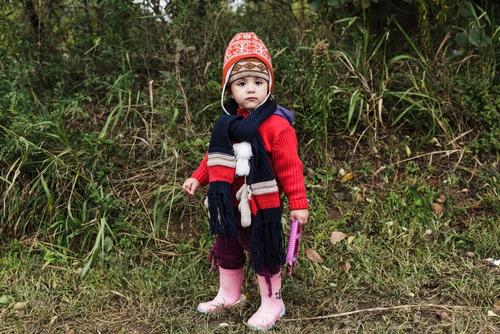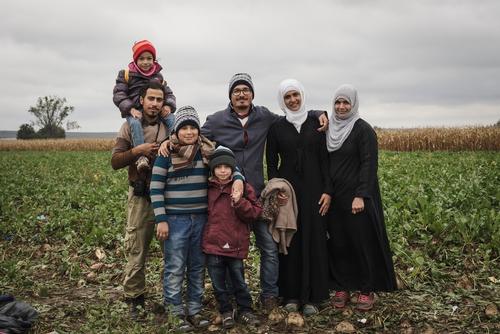“Our children were shaking with the cold.”
Mohammed, an accountant from Idlib, Syria, his wife Bayan and brothers Obaida and Abdullah are travelling from Syria with their cousin Suha and her two children, Waleed, 5 and Leen, 4. They came to MSF’s mobile clinic at the Serbian border with Croatia on Friday 25 September as the children were suffering from colds. The group spent the night and most of the next morning stranded in no man’s land between the borders alongside another 800 people. At night there was a heavy thunderstorm and limited shelter available for the family.
"My wife and I were married a month before our journey. We want to have a family one day, but I knew we would not be able to travel with a new baby. We left our country because it was no longer possible for us to live there safely – we have stayed through four years of war. Before the war, we were very happy in Syria. It was a safe and beautiful country with a Mediterranean climate. Many Syrians have already lived in Europe, but they always wanted to move back – everyone loved living in Syria. I worked as an accountant and so did my brother Obaida. Our parents are still living there and we hope that we might be able to bring them to visit us. It wasn’t possible for them to make this journey.
The hardest part was the sea crossing from Turkey to Greece. The waves were really strong. We tried to tell the children that it was like an adventure to try to keep them calm, but it was very dangerous. A wave crashed over the side and my clothes were completely soaked through. My brother had to sit me down in the boat and wrap me in blankets. I was shaking for an hour.
We travelled through Greece and Macedonia, before crossing into Serbia yesterday. We reached the border with Croatia at around 9am. We were told that it would be two or three hours before everyone would be moved from here. We waited and waited. Some buses took people back to Serbia but most of us were stranded and had to sleep here. We’ve never slept outside before – this was a first for us. Unfortunately it started raining – it was like a tropical storm and rained continuously for three hours. Thank god for the plastic sheeting. Most of the families received some sheeting to sleep under, but a lot of the single people, maybe around 200, didn’t have any at all. They slept in the rain. There was thunder and lightning for three hours and the children were shaking with the cold, but also with fear. They already had colds and now my brother has got the flu. Our medical problems have mostly been because of the wind and rain. We are all very tired, and the children are cold and hungry.
They need to put a camp here or some shelter, or at least to make their procedures faster. We need to finish our journey as soon as possible and not be stuck at every point. We suffer with every country that we pass through. We hope they can make the procedures faster and safer for people to reach Europe – especially for families. If I was young and alone it would not be as difficult, but with a family it is different and there is no provision for those travelling with children.
We have not chosen which country we want to move to yet – perhaps Germany or Sweden – we are trying to decide where would be the best place for us. What we are looking for is somewhere where we can speak the language, so we can get a job. But above all else we want to live in a country that is at peace; a place that is safe for our family."

“We have to remind to our children we are not in Syria anymore.”
Rand, 30, from Damascus, brought two children to MSF’s clinic at Bapska, on the border between Serbia and Croatia, on 27 September 2015. Two-year-old Julie had a cold and eight-year-old Brahim had fallen off his scooter in Syria, cutting his lip, and needed our doctors to check on his stitches.
"One day I was walking near a school, when a big bomb fell on it. I saw three children die in front of my eyes. I said ‘enough, that’s it’. I didn’t want to leave my country, but after five years of war I finally decided enough was enough. I left Damascus one month ago and after two weeks in Lebanon I bought a ticket to Turkey.
I’m travelling as part of a group with some of my parents’ friends. There are three children in our group – including Julie and Brahim. It’s very hard for them, they don’t understand what is happening and they’re always terrified. They say things like, ‘Will the police come to take us to prison?’ and they ask if they are going to die. They are terrified of anyone who holds a gun or wears army clothes, or any loud noise at all. They jump and we have to remind them that we are not in Syria anymore. I don’t have any children of my own, and I thank god I didn’t have to bring a child on this trip. I could not stand to see a child of mine sitting on the side of the road needing food, warmth, rest.
The boat from Turkey was one of the scariest times for the children. They cried all the way. They started praying and told us they were doing it to make sure they would go to heaven if they died. They cried for much of yesterday. When we crossed the border last night it was about 11.30pm and we had to walk along a road between farms. It was very dark and the children find the walking very difficult. When it is wet, they cry and slip and fall down.
We slept in a tent provided by the army. There was no food or water and no light. We asked for blankets for the babies and although the soldiers were very kind, they told us they had nothing. There was a better camp not far away, but we could not walk anymore because the children were hungry and crying. Your heart breaks for the children.
They just don’t understand what is happening. They say, ‘Syria was ok, we want to go back home to our own beds, our own pillows. Just imagine – they see war as being preferable to this journey. They don’t understand that we are going to a country where they will be safe.
I am trying to get to Holland where I have some friends. The first thing I want to do is volunteer as a translator because I speak good English – in Damascus I taught English to students. My dream is to translate a novel from English to Arabic. My father taught Arabic to foreign students and he is a writer, so I have this gene from him.
I’d happily work as a cook, a cleaner – I’ll do anything. And then I will begin a new life. I want to have friends, a boyfriend, and to be able to do the things that any normal 30-year-old wants to do. I want to live in a country where the government treats you like a human being, where you can vote, where you have a voice. I want to know what that feels like."



